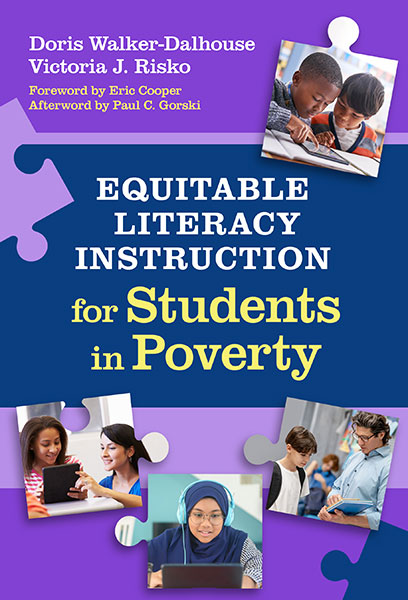Professors: Request an Exam Copy
Print copies available for US orders only. For orders outside the US, see our international distributors.
Doris Walker-Dalhouse, Victoria J. Risko
Foreword by: Eric Cooper
Afterword by: Paul C. Gorski
Publication Date: September 27, 2024
Pages: 208
Series: Language and Literacy Series

“Equitable Literacy Instruction for Students in Poverty assembles the knowledge of respected researchers, practitioners, and school leaders about how to support successful literacy development for students living in poverty. It is a must-read for all who care about literacy, equity, and empowerment.” —Linda Darling-Hammond, president, Learning Policy Institute, and author of The Flat World and Education
Differences in performance between students living in poverty and more advantaged students are reflective of an opportunity gap, as opposed to a gap in student ability. Walker-Dalhouse and Risko focus on disparities in literacy achievement that might be attributed to color-blind practices, deficit mindsets, low expectations, or context-neutral practices. Situating literacy learning within a comprehensive view of literacy development, they provide a set of instructional practices that will best support students living in poverty. Specifically, vignettes from kindergarten through middle school classrooms are used to demonstrate practices that address critical areas of the reading process; are responsive to students’ racial, ethnic, cultural, gender, and linguistic histories and assets; attend to students’ strengths and needs; and go beyond short-term gains on high-stakes tests to support optimal and sustainable learning.
Equitable Literacy Instruction for Students in Poverty features vignettes from leading literacy scholars, including Elizabeth Baker, Susan Cantrell, Jill Lewis Spector, Allison Skerrett, and Kelly Wissman. Readers can use this resource to transform schools into nurturing and vibrant communities that are committed to change, equity, and diversity.
Book Features:
Doris Walker-Dalhouse is a professor of literacy at Marquette University, professor emerita at Minnesota State University Moorhead, past president of the Literacy Research Association, and member of the Reading Hall of Fame. Victoria J. Risko is professor emerita at Vanderbilt University, past president of the International Literacy Association, and member of the Reading Hall of Fame. They are coauthors of Be That Teacher! Breaking the Cycle for Struggling Readers.
“Equitable Literacy Instruction for Students in Poverty assembles the knowledge of respected researchers, practitioners, and school leaders about how to support successful literacy development for students living in poverty. It is a must-read for all who care about literacy, equity, and empowerment.”
—Linda Darling-Hammond, former board member of the National Urban Alliance (NUA), president and CEO of the Learning Policy Institute
“Wondering how to positively change the learning trajectory for children of poverty? Wonder no further! Walker-Dalhouse and Risko have shared a must-read text that provides facts, insights, and instructional practices introducing the many faces of poverty and its relationship to literacy learning; how to make an upward spiral out of poverty a reality; and fearless ways to advocate for equitable opportunities and growth for all students. This powerfully engaging text should be read, not just by educators, but also by every citizen heading to a ballot box.”
—Diane Lapp, Distinguished Professor of Education, San Diego State University, and instructional coach, Health Sciences High
“In this volume, the reader will share in the research, stories, actions, and determined advocacy that point the way toward making sustained improvements for America's children and youth.”
—From the Foreword by Eric Cooper, president and founder, National Urban Alliance
“The authors correct the deficit misperceptions by showing how students experiencing poverty are the targets, not the causes, of educational disparities…. What a different world schools would be if we each embraced these lessons.”
—From the Afterword by Paul C. Gorski, founder, Equity Literacy Institute
Professors: Request an Exam Copy
Print copies available for US orders only. For orders outside the US, see our international distributors.